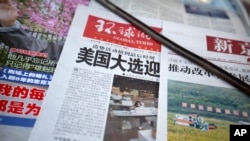China’s decision to ban BBC World News from its television networks suggests increased government efforts to restrict foreign media.
The ban took effect on February 11. It was ordered shortly after the BBC produced a series of stories about ethnic Uighur women in China’s Xinjiang region.
China’s order also came after the British agency in charge of broadcasting canceled the official permission of China’s CGTN news network to operate in Britain. British officials said the decision was linked to CGTN’s ties to China’s ruling Communist Party.
In the series, the women reported abuse in government-run internment camps. More than a million people are estimated to be detained in such camps and in prisons across Xinjiang.
The Chinese government has described the internment camps as job training centers and schools. It says the camps are necessary to fight Islamic extremism and a Uyghur separatist movement.
But former camp detainees have repeatedly reported abusive treatment in the camps.
China accused the BBC of reporting false news in its coverage of the internment camps. The government has also criticized BBC for reports about the COVID-19 pandemic in China.
China’s main broadcasting regulator, or controller, announced the ban in a statement. It accused the BBC of violating government rules about reporting on China. The news organization had, the statement read, “failed to meet the requirements to broadcast in China as an overseas channel.”
Hu Xijin, editor of the Chinese government-run Global Times newspaper, tweeted that the reports were “all false.” He added that the BBC “has become a bastion of the Western public opinion war against China.”
The action against the BBC adds to an increasingly difficult reporting environment in China. At least 17 journalists were expelled from China in 2020, the Foreign Correspondents Club of China said in a statement in September.
Several had their media identifications canceled after the United States declared a number of Chinese media organizations in America as foreign missions.
Sari Arho Havren is a China expert based in Brussels. She says the Chinese government wants to establish a “new world media order.” With media in China already under strong control, the government is likely to make foreign media the next target, Havren told VOA.
“[The BBC ban] demonstrates how foreign media operating in China is increasingly treated as domestic media, meaning that the reporting from China that is not in line with the official party line will become increasingly sensitive and risky,” Havren added.
China’s aim to restrict news covering sensitive issues within the country is nothing new. The government feels Western media unfairly targets and misrepresents local issues in the country. Government-run media or officials in China often describe such reports as fake news.
The group Reporters Without Borders produces the World Press Freedom Index, a yearly report on 180 countries. It named China the third most restrictive country in terms of media freedoms.
One Beijing-based foreign reporter told VOA that Chinese citizens are becoming less willing to speak with foreign media. He said nine out of 10 locals cancel meetings planned with reporters. The reporter asked not to be identified, fearing he might be punished for his words.
“Less and less people want to talk to us,” he said, adding, “They are always afraid.”
I’m Bryan Lynn.
Tommy Walker of VOA News reported on this story. Bryan Lynn adapted the report for Learning English. Caty Weaver was the editor.
We want to hear from you. Write to us in the Comments section, and visit our Facebook page.
_______________________________________________________________
Words in This Story
internment – n. the act of putting someone in prison for political reasons or during war
bastion – n. a place or system in which something continues to survive
domestic – adj. inside one country and not international
fake – adj. false; not real





